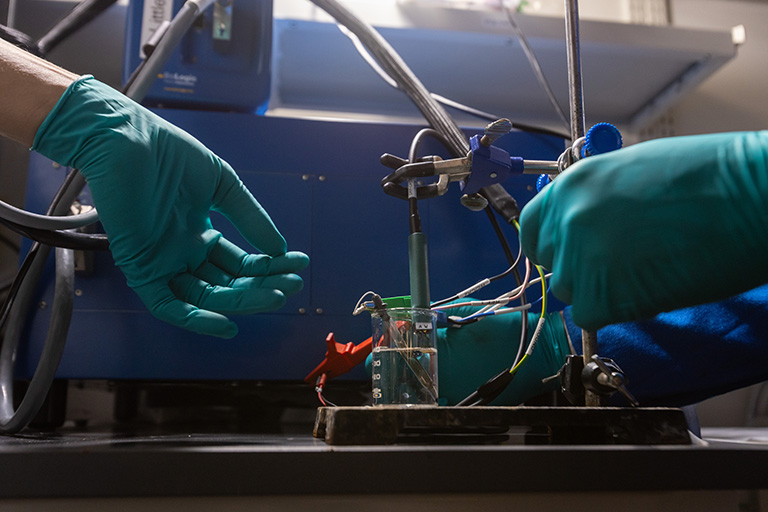
Chemical and biomedical engineering fields employ a range of diverse skill sets but share a common goal: solving complex problems through collaborative and interdisciplinary approaches. Researchers in chemical, biomedical and biological engineering work at the exciting crossroads of multiple disciplines including medicine, veterinary science, nutrition and natural resources, crafting solutions that shape the future of health and the environment.
Focus Areas
- Biological / Biomedical Imaging
- Bioprocess and Food Process Engineering
- Catalysis
- Computational Materials Science
- Electrochemistry and Atomic Layer Deposition
- Energy Conversion and Storage
- Materials for Environmental Sensing
- Micro / Nano Devices
- Neuroengineering
- Regenerative Medicine
- Soft Materials and Bioelectronics
- Theranostic nano-delivery devices
- Thin Films and Nanocoatings
- Water Studies and Sustainability
Featured Research Projects

Noel Aloysius
Title: Monitoring hydrologic and vegetation changes in the Swan Lake National Wildlife Refuge
Sponsor: Allstate Consultants
Amount: $848,155
Project Period: 5/15/24-12/31/34

Sheila Grant
Title: Accelerating Materials Design and Manufacturing through Artificial Intelligence and Machine Learning
Sponsor: Arizona State University
Amount: $1,873,408
Project Period: 3/28/24-3/27/26
Title: Technology, Entrepreneurship and Commercialization Hub
Sponsor: National Science Foundation
Amount: $5,499,466
Project Period: 2/1/24-1/31/28

Caixia “Ellen” Wan
Title: Biochar-based panels for environmental remediation applications
Sponsor: U.S. Forest Service
Amount: $344,468
Project Period: 7/24/24-8/21/27
Title: SBIR: Development of an innovative algae-based approach for producing CO2 derived biopolymers
Sponsor: Quasar Energy Group
Amount: $344,468
Project Period: 8/23/23-8/27/25
Title: Pilot demonstration of a modular bioprocess system for manufacturing consumer bioplastics products from food wastes
Sponsor: Virginia Tech
Amount: $462,500
Project Period: 1/1/23-11/30/25

Kiruba Krishnaswamy
Title: CAREER: FEAST (Food Ecosystems and Circularity for Sustainable Transformation) framework to address hidden hunger
Sponsor: National Science Foundation Directorate for Engineering
Amount: $418,193
Project Period: 6/1/24-5/31/29

Yangchuan Xing
Title: NSF Engines Development Award: Advancing microelectronics technologies (MO, KS)
Sponsor: National Science Foundation Directorate for Technology, Innovation and Partnerships
Amount: $300,393
Project Period: 5/15/23-4/30/25

Matthias Young
Title: Understanding interphase layer formation at the cathode/solid-electrolyte junction
Sponsor: National Science Foundation Division of Chemical, Bioengineering, Environmental and Transport Systems
Amount: $537,725
Project Period: 8/1/22-7/31/25